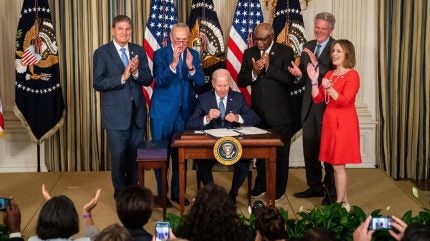
In a move hailed by Democrats as selfless but criticised by Republicans as pre-planned, President Biden on Sunday (21 July) announced he will not run in November’s elections, instead endorsing Vice President Kamala Harris.
Biden’s decision follows months of declining support. Amid a disastrous debate performance against former President Trump and mis-introducing Ukraine’s President Zelenskyy as “President Putin” at the Nato summit in Washington, calls for the 81-year-old to step down grew unignorably louder – as did the number of major Democrat backers withholding donations.
The final, emblematic straw came when Biden retreated to his holiday home in Delaware to recover from Covid-19, contracted while campaigning in Las Vegas last week. Trump, on the other hand, was pictured raising a defiant fist following a failed assassination attempt at a rally in Pennsylvania.
While Republicans have called for Biden to step down immediately, he is still expected to see through his final months in the Oval Office. It remains to be seen whether the President will use this surplus time to push further green energy projects, such as yesterday’s (22 July) announcement of $4.3bn in grants.
It is a humbling end to a half-century career in US politics – but missteps and cognitive decline are far from the defining features of Biden’s legacy, which history will remember more kindly than the current political moment.
The Inflation Reduction Act – Biden’s flagship policy
The Biden administration will be remembered for planting the seeds of climate change-tackling policies which will curb US emissions, historically the largest in the world, for years to come.
In 2022, Biden worked with Democrats on Capitol Hill to pass the Inflation Reduction Act, the largest climate bill in history.
The bill streams hundreds of billions of dollars into tax subsidies and grants for low-carbon energy projects and supply chains.
This has “created a massive investment boom in the US in batteries, EVs and clean energy”, according to Christopher Papadopoullos, senior thematic analyst at Power Technology‘s parent company GlobalData.
“The Inflation Reduction Act has not been in place long enough to see the US clean energy industry rival China’s, but did spur the EU to introduce the Net Zero Industry Act,” Papadopoullos tells Power Technology‘s sister publication Energy Monitor. “Biden has contributed in a big way to the global clean energy investment race.”
Biden’s fluctuating oil and gas policies
During the Biden tenure, which began in 2020, the US extended its lead as the world’s largest oil producer.
The US produced 21.91 million barrels of oil per day in 2023, more than double the oil production of second-placed Saudi Arabia. The US accounted for 22% of the world total, up 2% from 2022.
Biden’s critics on green energy also point to his inaction on liquified natural gas (LNG). Primarily made up of methane, LNG is up to 80 times more potent than CO2, and the US became the world’s biggest LNG exporter under Biden too.
The President did, however, pause new LNG export licenses in January, but only to countries with which it does not have Free Trade Agreements (FTAs) in place.
Despite acknowledging “the perilous impacts of methane on our planet”, Biden reassured key trading allies that “the US remains unwavering in our commitment to supporting our allies around the world. Today’s announcement will not impact our ability to continue supplying LNG to our allies in the near term.”
Republicans argued that the decision weakened the US geopolitically. If elected, Trump would likely end the Energy Department’s pause on new LNG licenses, part of his ‘drill baby drill’ vow as he seeks funding from oil giants.
Little seems set to stop the US LNG exports being expected to double by the end of the decade.
The Paris Agreement: a protracted Biden-Trump spat
Trump and the Republicans’ criticism of Biden’s overarching push to green energy has also homed in on the Paris Agreement.
Struck at a UN climate summit in 2018, the Paris Agreement holds countries to reduce greenhouse gas emissions. It was widely lauded as one of the most collaborative, transnational pieces of climate legislature – until Trump withdrew the US from it in 2016.
Biden’s decision to rejoin the Paris Agreement in 2021, while largely symbolic, “helped private sector investment by giving a sign of intent and some policy certainty”, Papadopoullos adds.
This firmed up the US’ commitment to reduce national greenhouse gas emissions by 50-52% by 2030.
“Leaving the Paris Agreement in the first place did not have a significant impact on the commitments of other countries or on US companies’ climate commitments,” Papadopoullos tells Energy Monitor. “Many major US corporations committed to cut their emissions even while the US was out of the agreement. Climate change is viewed as a very long-term issue, so many companies and countries tend to look past the four-year election cycle.”
The same long-term thinking will be applied to Biden’s final days in office – and the first months of whoever sits in the Oval Office come November.
Be it Trump, Harris, or another unlikely outsider, they will inherit four years of strong green energy policy, a part Biden’s legacy which will, overall, be remembered positively.


